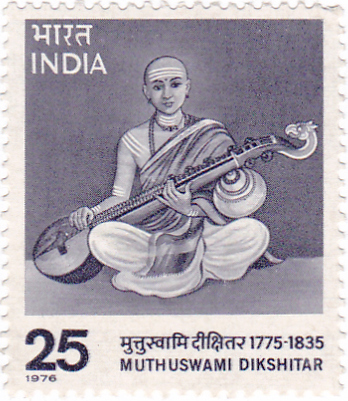Muttusvami Diksita, 1775-1835
Enlarge text Shrink textMuthuswami Dikshitar (Mudduswamy Dikshitar) (IAST: muttusvāmi dīkṣitar, 24 March 1776 – 21 October 1835), mononymously Dikshitar, was a South Indian poet, singer and veena player, and a composer of Indian classical music, who is considered one of the musical trinity of Carnatic music. Muthuswami Dikshitar was born on 24 March 1776 in Tiruvarur near Thanjavur, in what is now the state of Tamil Nadu in India, to a family that is traditionally traced back to Virinichipuram in the northern boundaries of the state. His compositions, of which around 500 are known and are noted for their elaborate, poetic descriptions of Hindu gods / temples and for capturing the essence of the raga forms through the vainika (veena) style that emphasises gamakas. They are in a slower speed (chowka kala). He is also known by his signature name of Guruguha which is also his mudra (and can be found in each of his songs). His compositions are sung and played in classical concerts of Carnatic music. The musical trinity consists of Dikshitar, Tyagaraja (1767–1847), and Syama Sastri (1762–1827). However, unlike the Telugu compositions of the others, his compositions are predominantly in Sanskrit. He also composed some of his kritis in Manipravalam (a combination of the Sanskrit and Tamil languages). There are two schools of thought regarding the pronunciation of his name. The name is pronounced as 'Muthuswamy Dikshitar'. Muthuswami is a common Tamil name (Mutu translates to pearl in Tamil, cognate to Mutya in Sanskrit) and is derived from Selvamuthukumaraswamy, a deity of the famed Vaideeswaran temple in Myladuthurai. However, T K Govinda Rao explains in Compositions of Mudduswamy Dikshitar that "the word Muddayya is an epithet of Kumaraswami or Guha. Further, in the original Telugu publication of Sangita Sampradaya Pradarshini (1904) Sri Subbarama Dikshitar mentions his name as Mudduswamy. Also, in the known composition of Dikshitar, "Bhajare re Chitha" in raga Kalyani, the "mudra" or signature of the composer appears in the text as "Guruguha Roopa Muddu Kumara Jananeem".
Read more on Wikipedia >
 Personality
Personality



